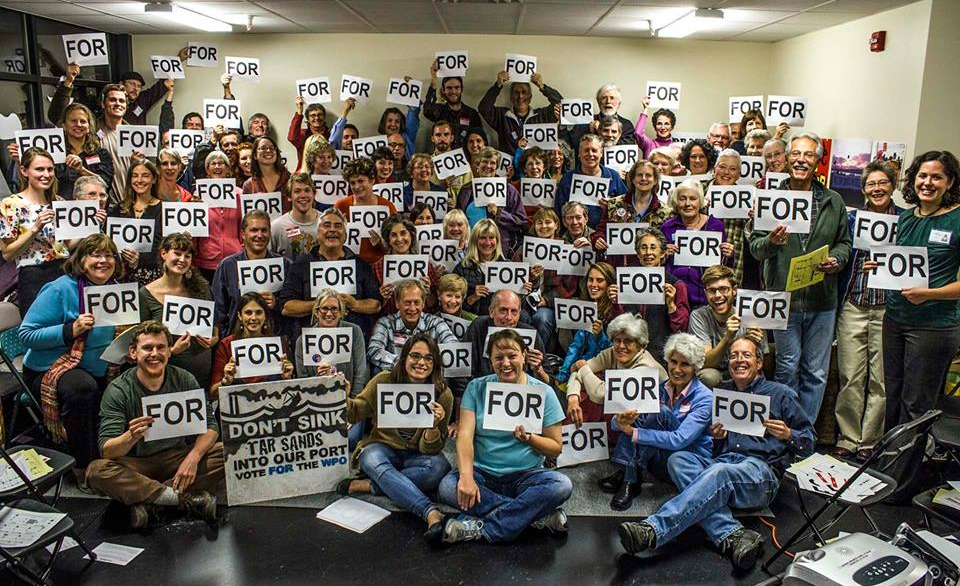http://www.commondreams.org/headline/2013/10/28-2
Published on Monday, October 28, 2013 by Common Dreams
Industry cash and lobbyists pour into coastal Maine town in effort to defeat residents’ initiative to block dirty oil project
– Sarah Lazare, staff writer

Protect South Portland rallies in favor of the Waterfront Protection Ordinance (Photo: damp wood)Big Oil is sparing no expense in its bid to crush efforts by residents of South Portland, Maine who are taking the fossil fuel industry head-on to save their waterfront from tar sands.
Campaign finance reports revealed Friday that the oil industry has poured over $600,000 into a campaign to defeat the Waterfront Protection Ordinance—a land-use zoning ordinance up for referendum in the November election, that is backed by grassroots organizations and would block oil industry efforts to build a tar sands export facility.
“Clearly they have all the money. We are talking about some of the wealthiest corporations in the world. They do not want a community to stand up for itself. They are going to do everything they can to squash our initiative.”
–Robert Sellin, Protect South Portland
The oil industry is likely to break all records on campaign spending in this coastal town of 25,000 people, out-spending local environmental and community groups six-to-one.
“Oil industry spending is completely over the top,” said Robert Sellin, from the group Protect South Portland, in a phone interview with Common Dreams. “Clearly they have all the money. We are talking about some of the wealthiest corporations in the world. They do not want a community to stand up for itself. They are going to do everything they can to squash our initiative and discourage other jurisdictions.”
While the Keystone XL pipeline is still under review by the State Department, the fight in South Portland shows that oil and pipeline industries are pressing to expand routes across the U.S. and Canada.
The campaign to defeat the Waterfront Protection Ordinance is bankrolled by the Washington, D.C.-based lobbying group American Petroleum Institute, as well as the Portland Pipe Line Corporation. The hundreds of thousands of dollars are being used to run advertisements, hire consultants and strategists, and employ canvassers.
“They have been stuffing our mailboxes with shiny mailers and our phones have been ringing off the hook with robo calls, and we’re so sick of it,” said Cathy Chapman, a South Portland resident.
In contrast, local organizations in favor of the ordinance’s passage have collectively spent only $107,000. Protect South Portland says that the $31,000 they have spent in favor of the ordinance came from 192 people donating an average of $42.49 each.
“Our citizen group—Protect South Portland—is volunteer-powered by neighbors and is grassroots,” said Crystal Goodrich of Protect South Portland, who also questioned the tactics of the oil lobby.
The Portland Pipe Line Corporation applied four years ago for a permit to use South Portland as the potential location for an alternate tar sands pipeline. The plan was to use a 70-year-old, 236-mile pipeline, currently employed to transport crude oil from freighters in the South Portland harbor to Montreal, to instead transport tar sands oil from Alberta, Canada. This would be accomplished by reversing the flow of the pipeline, and the tar sands oil would be distributed to international markets via oil tankers and an upgraded terminal in South Portland.
The upgrade would include two 70-foot smokestacks erected on the South Portland waterfront that would spew pollution, including carcinogenic benzene, into the atmosphere. Freighter ships transporting crude oil from Casco Bay would increase the risk of spills, and tar sands storage tanks would be erected near area schools.
PPLC President and CEO Larry Wilson now claims that his company has no immediate plans to move forward on this project, though has said his company won’t rule it out. Meanwhile, PPLC is putting up a vigorous fight against community efforts to prevent tar sands distribution at the South Portland waterfront.
Sellin said that the same tactics the oil industry is using against local residents are used in a bid to force the tar sands industry on communities all over the world. “I hope that people would think about their local situation and how they can use what powers they have to defend their communities,” he said. “We encourage all communities nationally and internationally to look at what’s available and stand up.”